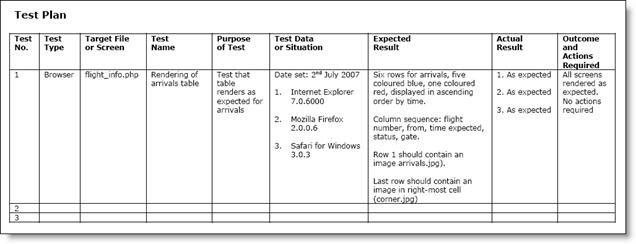Starting a testing project with writing a test plan is old school, I guess. Still, I see a lot of value in defining a thorough test plan first. But I wonder how many of us in the test community value writing a test plan in these agile ages. My views on the value of a good test plan are described in this post. I am curious to see your views on this topic. So please leave a comment if you agree or disagree.
Value of A Test Plan
Most important, the value of at test plan is that it makes you think about all the important stuff beforehand. It is the design of what you think should be done, whom is involved, when things will take place and why or why not. Therefore a test plan, should clarify at the least these topics:
- test objects and the objectives: what are you going to test (and what not);
- test approach: how are you going to test and why;
- resources: who do you need for which activity;
- planning: when will you be carrying out which test activities and who do you need.
So I think of the test plan as a design. The design provides the structure of what has to done and how it is done. Keep in mind that testing, like software development, needs a good structure too. Within a good structure you can work efficiently and effectively, provide prove of your results and save items for reuse.

Test Plan is Communication
Furthermore, I think of the test plan as a means of communication with your stakeholders, testers and anyone else of interest. Let me elaborate on that, because I believe it is utterly important aspect of the rest plan.
Your stakeholders must be informed and must get the reassurance that the testing is in good hands. A solid test plan helps you to gain their trust. Seen from the outside, testing is all about trust. As a test manager you must come across as reliable and assure the testing will be reliable too and that it will result in a trustworthy information system. As a test manager you’ll need to clarify with your stakeholders what trustworthy means is in the context of your assignment. And to get there: get their view on their needs and potential risks. This all is input for the test plan. The plan will help to manage their expectations of what testing can contribute to the end result (and what not).
What to Expect
Next, your testers must know what is expected of them. Depending on the testers in your team, you’ll need to inform them in more or less detail. When you work with inexperienced testers or end users it is even more important to be clear on how you work. You don’t want to start off with coincidences and chaos. Most people like to get provided a clear picture and don’t want to figure things out themselves, especially if they have no experience or time doing so.
Estimation of Testing
And lastly, another important aspect of the test plan is that it should indicate the duration, costs and efforts of testing. From a management perspective testing is often seen as costly, too much time consuming and not adding value. So a good test plan provides the structure (the what and how) and defines which efforts are required by whom and when and the justification of all that (the why).
Of course a plan is a bunch of bits and bytes and things will turn out differently in practice. But only because I have a well-thought-out test plan, I am able to anticipate and adjust the course of the test trajectory and prevent chaos, because the structure still holds.